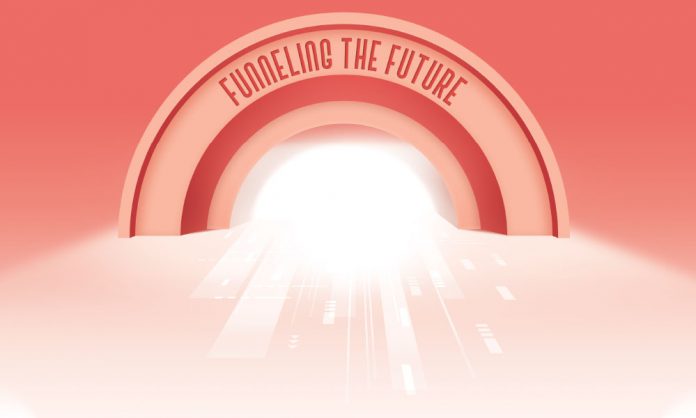The marketing funnel has been a fundamental tool for marketers, representing the buying journey of the target audience. Enter digital marketing, and the same funnel became one of the main strategic tools to incorporate the purchasing journey of digital platform users. Yet mapping user journeys over the digital media changed the funnel considerably, adding a lot more depth to each of its purchase and post-purchase phases i.e. Awareness, Engagement, Consideration, Purchase, Retention and Advocacy or Referral.
The following example can help in understanding the role of the digital marketing funnel in a customer’s journey. Here it is also important to note there is a high possibility that a prospective buyer may move back and forth within the funnel stages. Illustrating the stages, a business owner realizes that they need to implement a combination of point-of-sales and accounting software for their growing business needs, yet they need to find the most viable option from those available to purchase. In this situation, the customer was initially somewhere in the Consideration stage since they knew what they required; from where they went back to the Awareness stage to look for and gauge the right product to suit their business needs. The customer possibly utilized digital search engines like Google etc. to search for relevant solutions, and might have considered peer recommendations. Next, the customer would have looked at details for such POS systems that would have interested them (Engagement stage), including finding out more about such software that they find fitting their business needs (Consideration stage), possibly through the company selling such solutions as well as any peers who may be using something similar. Each time the business owner finds something suitable to some extent, they would go to the Consideration stage for evaluating solutions that fit most of their software requirements for the business. Finally after evaluating possible options, the customer eventually buys the most suitable POS and accounting system based on their business requirements (Purchase stage). The Retention stage ensures that the solution-provider equips the customer technically with the necessary information so that they stay with the POS solution they bought, going as far as to build a strong relationship with the customer in the process by going beyond expectations in providing technical services, as well as incorporating customer feedback on improving product or the service provided. Finally, at the Referral stage, if the business owner is a satisfied customer, they may recommend the POS and accounting system to any of their peers looking for a similar solution. They may post reviews on digital forums, for instance the product’s website etc. advocating the feasibility of the software.
While there are a number of marketing models that work at customer acquisition, the strategy that utilizes the full-funnel digital model is Growth Marketing. Growth marketing utilizes data to help businesses develop a customer base and generate revenue by targeting potential clients. Its primary function is to reach out to people who are already looking for what the business has to offer to drive growth, as well as targeting new audience.
A very good example can be Suzuki’s Certified Used Car Gala conducted by Suzuki Pakistan online. Suzuki Pakistan has been holding the Used Car Gala on-ground since the past eight years across multiple cities in Pakistan. Yet in 2021, even though businesses were allowed to resume economic activities after COVID-19 came about; a nationwide ban on gatherings of more than 100 people to keep the spread of the coronavirus in check was still in effect and the car manufacturer decided to take the bi-annual sales event from conducting it on-ground to online. Since car buying is a high involvement activity, a microsite was created hosting used cars certified by Suzuki professionals where visitors could browse through the cars and book appointments to inspect them physically at participating Suzuki dealerships, before they would decide to make the purchase. The communication revolved around convincing prospective car buyers that transitioning from a physical to a digitally-held event is overall convenient, comfortable and beneficial. Utilizing growth marketing; awareness was created using social media, and local digital publishers for news and entertainment as well as websites that would host information on automobiles. These included car trading and evaluation websites, which further aided in bringing relevant visitors to the Certified Used Car Gala microsite. Hence the target audience included prospective car buyers who would have otherwise visited the on-ground event. The strategy to promote the Certified Used Car Gala online not only resulted in high engagement on the microsite, rather there were sales conversions after visitors inspected the vehicles at the dealership. Also prospective car buyers were able to interact with the brand through online chat queries, and Suzuki dealerships across Pakistan attracted new customers. The car manufacturer was able to tap into new cities across Pakistan creating new sales prospects.
The Certified Car Gala is an example that illustrates the potential digital growth marketing has in the Pakistani market. Also, the market is generally in a growth phase where digital strategies can be channelled to create customers from the digitally-enabled younger generations and generate sales. Since the market is lesser tapped at the moment, the opportunity is ripe for businesses to achieve phenomenally high growth metrics, if executed correctly.
